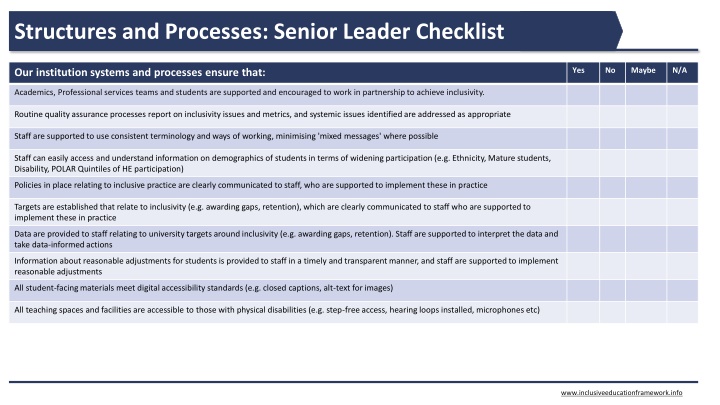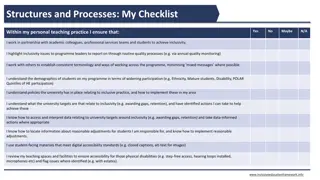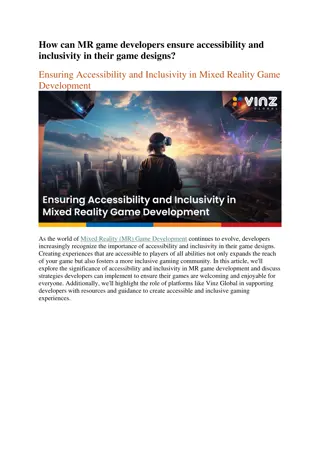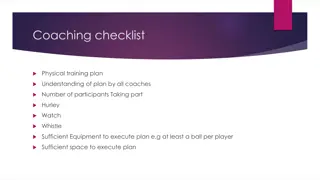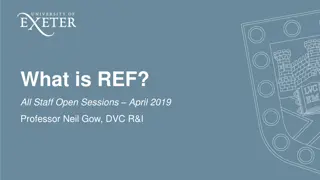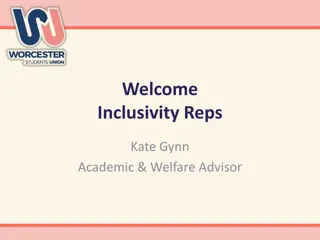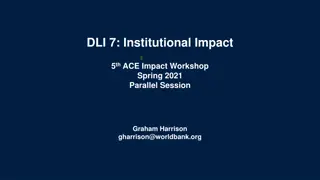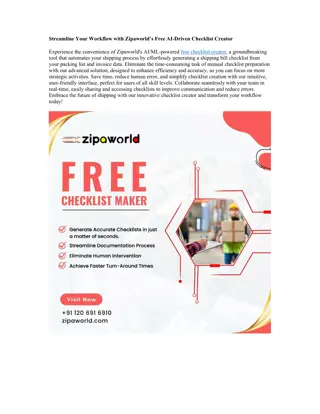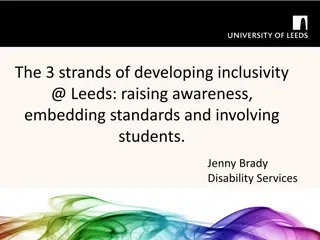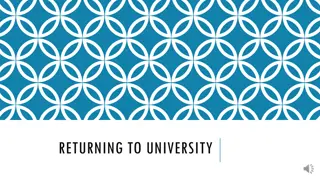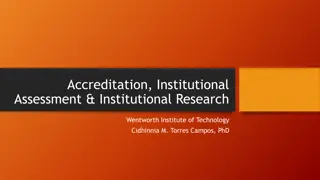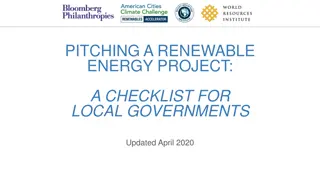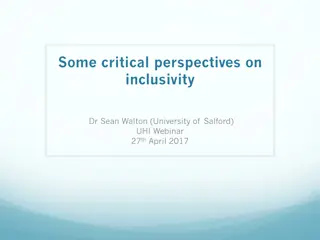Comprehensive Checklist for Institutional Inclusivity and Educational Excellence
This checklist covers key areas such as academic partnerships, inclusive curriculum design, and effective assessment processes to ensure inclusivity in educational institutions. It emphasizes supporting staff, engaging students, and promoting accessibility at all levels to enhance the overall learning environment.
Download Presentation

Please find below an Image/Link to download the presentation.
The content on the website is provided AS IS for your information and personal use only. It may not be sold, licensed, or shared on other websites without obtaining consent from the author.If you encounter any issues during the download, it is possible that the publisher has removed the file from their server.
You are allowed to download the files provided on this website for personal or commercial use, subject to the condition that they are used lawfully. All files are the property of their respective owners.
The content on the website is provided AS IS for your information and personal use only. It may not be sold, licensed, or shared on other websites without obtaining consent from the author.
E N D
Presentation Transcript
Structures and Processes: Senior Leader Checklist Yes No Maybe N/A Our institution systems and processes ensure that: Academics, Professional services teams and students are supported and encouraged to work in partnership to achieve inclusivity. Routine quality assurance processes report on inclusivity issues and metrics, and systemic issues identified are addressed as appropriate Staff are supported to use consistent terminology and ways of working, minimising 'mixed messages' where possible Staff can easily access and understand information on demographics of students in terms of widening participation (e.g. Ethnicity, Mature students, Disability, POLAR Quintiles of HE participation) Policies in place relating to inclusive practice are clearly communicated to staff, who are supported to implement these in practice Targets are established that relate to inclusivity (e.g. awarding gaps, retention), which are clearly communicated to staff who are supported to implement these in practice Data are provided to staff relating to university targets around inclusivity (e.g. awarding gaps, retention). Staff are supported to interpret the data and take data-informed actions Information about reasonable adjustments for students is provided to staff in a timely and transparent manner, and staff are supported to implement reasonable adjustments All student-facing materials meet digital accessibility standards (e.g. closed captions, alt-text for images) All teaching spaces and facilities are accessible to those with physical disabilities (e.g. step-free access, hearing loops installed, microphones etc) www.inclusiveeducationframework.info
Curriculum Design and Delivery: Senior Leader Yes No Maybe N/A Our institution systems and processes ensure that: Curriculum planning and design processes embed inclusive education, and staff are supported to achieve these in practice Students are active partners in curriculum design, development and delivery Programmes actively consider the content that students are likely to have covered before university (e.g. A level, GCSE, BTEC syllabus) and staff are supported to design interventions to address disparities and gaps in knowledge Programmes include opportunities for students to test relevant pre-existing knowledge before introducing new content and staff are supported to address any gaps identified Curriculum design processes ensure content has been reviewed to go beyond white European perspectives i.e. has been decolonised, and staff are supported to implement this in their areas Curriculum design processes enable staff to highlight diverse figures within the discipline to students (e.g. LGBTQIA+/Black/Asian/Disabled researchers, authors, or policy makers) Curriculum design enables students to personalise their curriculum, i.e. can focus on relevant topics of personal interest Staff are supported to work in partnership with students to review teaching materials, and pro-actively point out any language that is not clear and consistent Staff make teaching resources available in appropriate accessible formats in advance of scheduled teaching sessions wherever possible. Staff are supported to adopt an active and authentic learning approach, not being overly reliant on didactic lecturing, and designed to be accessible to all students (considering e.g. disability, international students, those with limited financial resources) www.inclusiveeducationframework.info
Assessment and Feedback: Senior Leader Checklist Yes No Maybe N/A Our institution systems and processes ensure that: Curriculum design ensures assessments are designed at the programme level, giving students and staff a manageable assessment workload. Programmes are designed to use a range of assessment formats, enabling student personalisation choice of assessment format where appropriate Programmes give students opportunities to practice all final year summative assessment types earlier in the programme, and the relationships between assessments at different levels are clearly understood by staff and students Assessments are clearly explained to students through module documentation, written materials and activities in class, using transparent and consistent language to make requirements clear. Staff are supported to develop assessments that design out the need for individual alternatives wherever possible (e.g. students given the choice of audio/visual formats so students with hearing/visual impairments do not require individual alternative assessment) Staff are supported to develop mark schemes which are clearly linked to learning outcomes or competencies to ensure marking is appropriate and consistent with assessment design Staff are supported to develop mark schemes that do not over-penalise mistakes in written English or referencing conventions Staff are supported to ensure feedback comments are constructive, and actively point out ways that students can improve their work for future assignments Staff are supported to provide relevant, focussed and timely formative feedback to support student learning Staff are aware of student anxieties around assessment and feedback, and encouraged to create a supportive culture around assessment, provide clear guidance, and offer opportunities for students to voice concerns www.inclusiveeducationframework.info
Community and Belonging: Senior Leader Checklist Yes No Maybe N/A Our institution systems and processes ensure that: Staff meet with all students they have responsibility for at multiple points during the academic year Staff have undertaken appropriate training so they understand their role and responsibilities around student academic and personal support Appropriate support services for students are provided, and staff can effectively signpost students to these services where required The institution ensures everyone feels welcome, included and supported from induction onwards, including within academic programmes and the wider institutional community Institutional hiring and admissions processes actively build a diverse community of staff and students Programmes are designed to provide opportunities for students to interact socially within structured activities, and student-led communities are supported and encouraged The institution establishes clear ground rules around inclusion and respect for all, developed in partnership between staff and students Students are active members of the institutional community who acts upon their feedback provided through formal and informal channels Staff are supported to design group work so that all students are actively included regardless of background, current circumstances or demographic group Staff are supported in ensuring that students can confidently raise concerns around inclusivity, including potential bias or discrimination. Staff are supported to feel confident about intervening in these areas if necessary www.inclusiveeducationframework.info
Pathways to Success: Senior Leader Checklist Yes No Maybe N/A Our institution systems and processes ensure that: Students are provided with clear information about commonly used academic terminology, degree classifications and institutional conventions throughout their programme 'At risk' students are systematically identify and supported (e.g. those with low engagement), and the institution provides resources for effective intervention by academic and professional services teams Individual student academic progress is regularly reviewed (e.g. after exam boards) and the institution provides resources and support for staff to intervene where appropriate The institution provides structured tools and resources designed to encourage student self-management, self-belief, and aspiration, and supports staff to embed these within programmes The institution provides relevant support and personal development services (e.g. academic skills support, dyslexia support, bereavement support), and supports staff in signposting students to them The institution provides careers guidance and related schemes (e.g. entrepreneurship scheme, Employability award), and supports staff in relating these to the personal ambitions of students where possible The institution develops student facing materials that demonstrate inclusivity and success (e.g. diverse and successful alumni/career role models), and supports staff to embed these within their programmes Programmes are designed to embed opportunities for all students to work with employers, develop personal networks and reflect on self development and career goals Programme placements and external opportunities are designed to be inclusive, particularly for those with caring responsibilities, health conditions, financial constraints etc Students are supported to access appropriate external mentorship programmes, networking and self-development opportunities www.inclusiveeducationframework.info
References Bliuc, A.-M., R. A. Ellis, P. Goodyear, and D. M. Hendres. 2011. The Role of Social Identification as University student in Learning: Relationships between Students Social Identity, Approaches to Learning, and Academic Achievement. Educational Psychology: an International Journal of Experimental Education Psychology 31 (5): 559 574. Cachia, M., Lynam, S, and Stock, R. (2018). Academic success: Is it just about the grades? , Higher Education Pedagogies, 3:1, 434-439 Crenshaw, Kimberl . Demarginalizing the Intersection of Race and Sex: A Black Feminist Critique of Antidiscrimination Doctrine, Feminist Theory and Antiracist Policies. University of Chicago Legal Forum 1989, no. 1 (1989): 139-167. Freeman, T. M., L. H. Anderman, and J. M. Jensen. 2007. Sense of Belonging in College Freshmen at the Classroom and Campus Levels. The Journal of Experimental Education 75 (3): 203 220. Hubbard, K., Gawthorpe, P., Fallin, L., & Henri, D. (2020). Addressing the hidden curriculum during transition to HE: the importance of empathy. In T. Hinchcliffe (Ed.), The Hidden Curriculum of Higher Education (59- 76). Heslington, York: Advance HE King, N. (1998) Template analysis , in G. Symon and C. Cassell (eds.) Qualitative Methods and Analysis in Organizational Research. London: Sage King, N. (2012) Doing template analysis , in G. Symon and C. Cassell (eds.) Qualitative Organizational Research: Core Methods and Current Challenges. London: Sage Krause, K. -L., & Armitage, L. (2014). Australian Student Engagement, Belonging, Retention and Success: A Synthesis of the Literature . Retrieved from https://www.heacademy.ac.uk/ node/8683 Leese, M. (2010) Bridging the gap: supporting student transitions into higher education , Journal of Further and Higher Education, 34(2), pp. 239 251. doi: 10.1080/03098771003695494. Margolis, E (2002) The hidden curriculum in higher education . New York and London: Routledge Mountford-Zimdars et al (2015) Causes of differences in student outcomes . Report to HEFCE by King s College London, ARC Network and The University of Manchester Thomas, L. (2012) What works? Facilitating an effective transition into higher education , Widening Participation and Lifelong Learning, 14, pp. 4 24. doi: 10.5456/WPLL.14.S.4. Thomas, L. & May, H. (2010) Inclusive Learning and Teaching in Higher Education , York: Higher Education Academy. Tinto, V. (1993). Leaving College: Rethinking the causes and cures of student attrition (2nd ed.), Chicago: University Press Universities UK and National Union of Students (2019) Black, Asian and Minority Ethnic student attainment at UK universities: #closingthegap. Universities UK; National Union of Students. Available at: https://www.universitiesuk.ac.uk/policy-and-analysis/reports/Documents/2019/bame-student-attainment-uk-universities-closing-the-gap.pdf. Waterfield, J. and West, B. (2006) Inclusive Assessment in Higher Education: A Resource for Change , University of Plymouth: Plymouth. Winstone, N. E. and Nash, R. A. (2016) The Developing Engagement with Feedback Toolkit (DEFT) , York: Higher Education Academy. York, T.T., Gibson, C., & Rankin, S. (2015). Defining and measuring academic success , Practical assessment, research and evaluation: Vol. 20, Article 5, 1 20 www.inclusiveeducationframework.info
